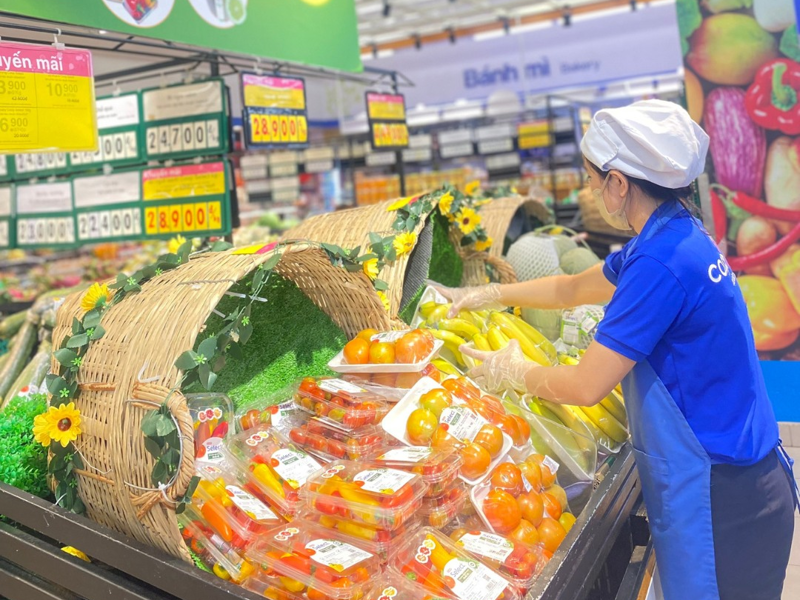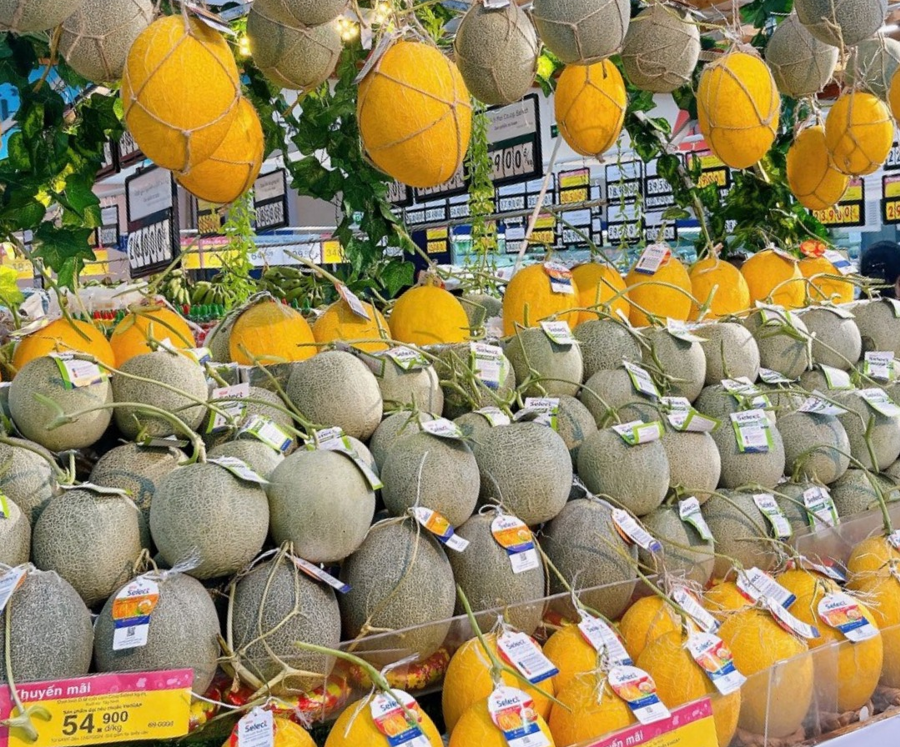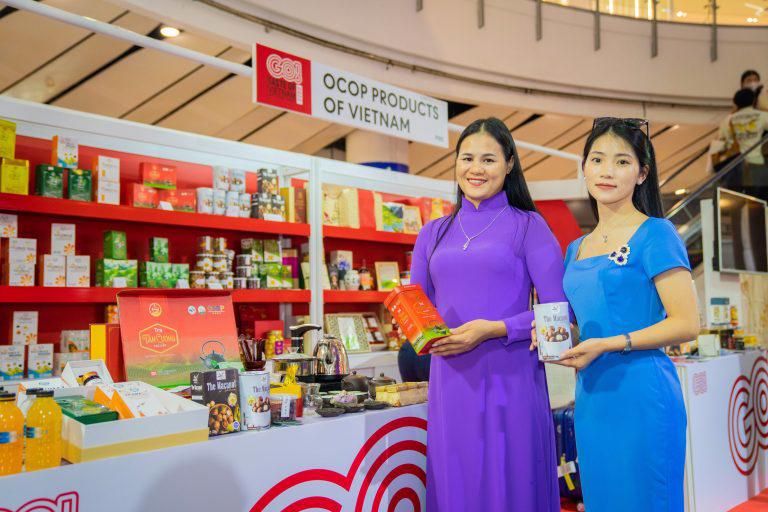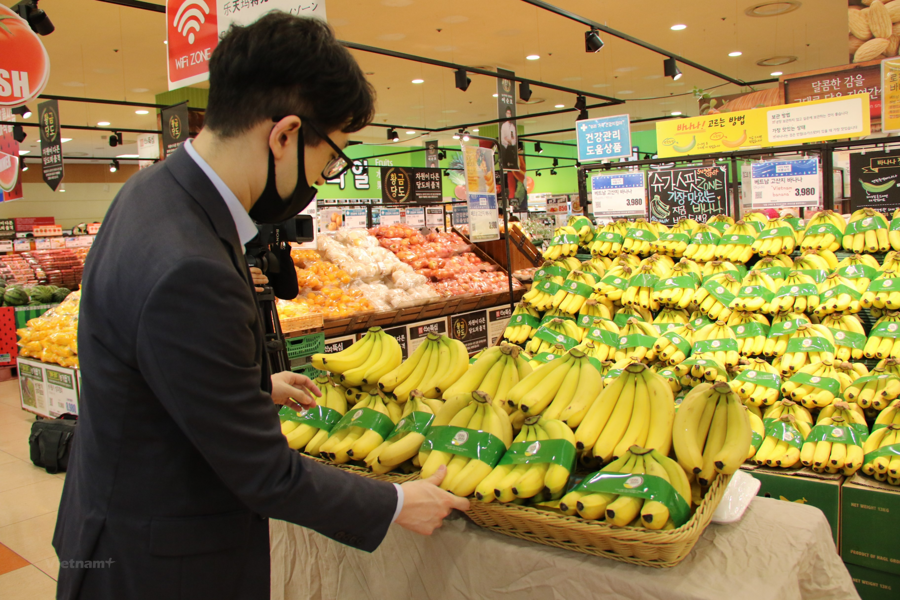Retail businesses boost consumption of Vietnamese agricultural products
With a population of over 100 million people, the domestic market is an area with great potential to boost the consumption of agricultural products. In addition, many businesses are currently making efforts to promote Vietnamese agricultural products to the world through retail channels...
 Illustration photo.
Illustration photo.
According to the Ministry of Agriculture and Rural Development, the annual agricultural output creates considerable pressure when the harvest season reaches its peak with over 42 million tons of rice, nearly 19 million tons of vegetables, over 12 million tons of key fruits, over 7 million tons of meat, and over 9 million tons of seafood. Therefore, connecting the production and consumption of agricultural products, especially high-quality food products, is necessary to contribute to solving the output of agricultural products.
FOCUS ON DOMESTIC MARKET
The story of market connection is not only necessary for export goods but also really urgent for the domestic market. According to the representative of the Department of Quality, Processing and Market Development, domestic and foreign retail channels are currently the effective bridge between manufacturers and consumers.
In the Mekong Delta - the country's largest agricultural granary - a number of businesses have actively exploited the domestic market, typically by bringing OCOP products into modern distribution channels. A survey at some border supermarkets in An Giang showed that there are up to 20,000 - 30,000 products of all kinds, 90% of which are Vietnamese goods. To stimulate consumption, An Giang province also organizes many meaningful promotional and trade connection activities. Typically, the weekend market of OCOP products and regional specialties with many preferential shopping vouchers is attracting many consumers.
Mr. Lam Van Tuan, Deputy Head of Event Management Department of Tu Son Supermarket said: "With a bill of 500,000 VND when shopping at the supermarket, people will receive an additional shopping voucher in the market worth 30,000 VND to buy OCOP products or products of businesses participating in the stimulus".
Similarly, for gardeners in Lam Dong province, strict control of product quality is to enhance the strength of producers, helping agricultural products to be better consumed in the domestic market. Currently, the agricultural region of Lam Dong province has formed 243 linkage chains corresponding to thousands of hectares of cultivated land. Consistent quality - something that farmers previously paid little attention to - is now considered by many as a criterion for agricultural products to be easily consumed.
 The story of market connectivity is not only necessary for export goods but also really urgent for the domestic market.
The story of market connectivity is not only necessary for export goods but also really urgent for the domestic market.
On the business side, the program "Accompanying OCOP - Honoring Vietnamese agricultural products", an event in a series of activities to celebrate International Cooperative Day, took place across the entire system of 800 points of sale of Saigon Co.op from July 4 to 17. Accordingly, the supermarket chains Co.opmart, Co.opXtra, Co.op Food... said they have traded more than 500 OCOP products including items from cooperatives nationwide. Therefore, this is an opportunity for people to access products across the country at affordable prices.
Having introduced grapefruit products to Co.opmart supermarket for quite a while, Mr. Le Minh Sang, Director of Tan My Fruit Cooperative (Binh Duong), said that the supermarket distribution channel has supported many product outlets for farmers. Currently, Tan My Cooperative has green-skin grapefruits that have achieved 4-star OCOP and is completing to launch two more salted products with reduced salt content, which are very safe for health.
According to Mr. Sang, cooperation between agricultural producers and retail chains is very beneficial for producers as output is smoother, avoiding revenue declines and increasing profits. This will help stabilize raw material sources not only for domestic consumption but also for export processing.
SPREAD VIETNAMESE BRAND
Recently, in addition to the domestic market, many modern retail systems in Ho Chi Minh City are also actively organizing networking events to support the introduction of goods, especially agricultural products, into neighboring markets. Deputy Director of the Ho Chi Minh City Department of Industry and Trade Nguyen Nguyen Phuong acknowledged that modern retailers have been taking positive steps in building cooperation programs to control the quality of goods, contributing to "spreading" Vietnamese brands to the international market.
 In the Central Retail supermarket system in Thailand, many Vietnamese products are popular with consumers.
In the Central Retail supermarket system in Thailand, many Vietnamese products are popular with consumers.
Typically, a representative of MM Mega Market Vietnam shared that since 2019, the unit has exported Vietnamese agricultural and seafood products including sweet potatoes, dragon fruit, grapefruit, coconut, pangasius, shrimp, etc. to markets such as Thailand, Singapore, Hong Kong and Turkey. Currently, the supermarket still regularly exports 2-4 containers/month of dragon fruit to the Thai and Chinese markets. In 2024, MM Mega Market expects to double the export volume of agricultural products, conquering demanding markets such as Australia, Germany and the Netherlands.
Similarly, a representative of Central Retail Group in Vietnam also said that in the Central supermarket system, up to 95% of products are Vietnamese goods. For example, Ca Mau shrimp, basa fish, Hoa Loc mango, etc. In the Central Retail supermarket system in Thailand, many Vietnamese products are favored by consumers such as dragon fruit, pho, vermicelli, coffee, tea, etc. In 2024, Central Retail hopes to continue to find more strong Vietnamese products to bring into the system and export abroad.
As one of the leading retail groups in Asia, Aeon Group (Japan) is currently purchasing products from 48 countries around the world. Mr. Yuichiro Shiotani, Director of Aeon Topvalu Vietnam (Aeon Group) said: "Vietnam is the country that Aeon focuses on the most in terms of importing and developing products". Recently, the Ho Chi Minh City Investment and Trade Promotion Center (ITPC) has also regularly coordinated with Aeon Vietnam to organize networking events to support bringing Vietnamese goods into Aeon's system in the Japanese market.
 Vietnamese bananas are sold at the Lotte Mart supermarket complex near Seoul Central Station.
Vietnamese bananas are sold at the Lotte Mart supermarket complex near Seoul Central Station.
In Korea, fresh Vietnamese banana products have also been sold by Lotte Mart in its supermarket chain since 2020, under the brand name Lopang Banana. The product introduced in Korea is banana grown on the highlands in Lo Pang commune (Mang Yang district, Gia Lai province) with a large temperature difference between day and night, thick skin, higher sweetness than similar products, and highly competitive prices.
From this, it can be seen that agricultural and food producers should seriously change their thinking, focusing on developing products that suit the needs and tastes of not only domestic consumers but also neighboring markets. At the same time, instead of being familiar with traditional export methods, agricultural enterprises need to adapt to new consumer trends in multi-channel shopping, paying attention to online business, and selling through emerging technologies. This also helps businesses reduce intermediary costs and increase output efficiency.
Thuy Linh


